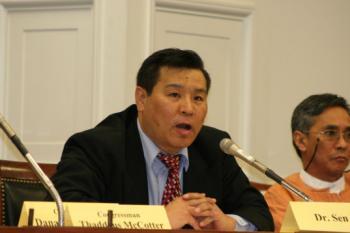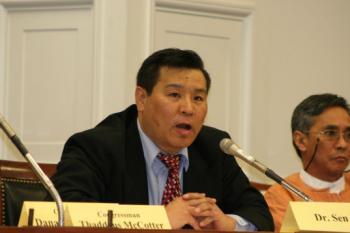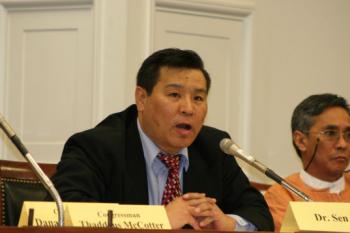WASHINGTON—As the new Obama administration gets into gear, hopes are running high among many in Congress and some non-government organizations (NGOs) that the United States will be reinvigorated in its advocacy of human rights and religious freedom.
President Obama’s executive orders closing Guantanamo and ending the use of torture in interrogations of terror suspects was interpreted by many that the new administration was going to take a different path with respect to human rights from the previous administration.
Many high-ranking officials in the new administration, for example the U.N. ambassador Susan Rice, who in the past has spoken out on Darfur, have reputations of being strong advocates for human rights.
On Thursday, several Congress members, joined by Asian leaders of human rights NGOs, spoke out at a forum on Capitol Hill on the deteriorating human rights and freedom in China, Vietnam, Burma, Tibet, East Turkestan, Laos, and Thailand and how they want the United States to become more proactive in addressing the abuses.
“The brutal rule of communism is shared in Asian countries,” said Professor Sen Nieh, representing the Global Mission to Rescue Persecuted Falun Gong Practitioners. The realization that human rights are universal, that Asians as much as anyone else want freedom and dignity, provided the backdrop for forming the Coalition of Human Rights in Asia, which sponsored this forum. This was a loose coalition of 16 human rights organizations that were later joined by a few other organizations.
“Communism was only defeated in Europe,” said Congressman Lincoln Diaz-Balart (R-Fla.), quoting from Congressman McCutter (R-Mich.), who likes to remind people of this fact. Congressman Diaz-Balart, who was born in an “enslaved state” (Cuba) continued: “Communism is very much alive with its diabolical evil.” He explained that just because a communist country like China has adopted some capitalistic features does not change its basic character.
Spokespersons on behalf of the Tibetans, Uyghurs, and Falun Gong described the difficulties their respective groups have with the suppression and violence from Chinese authorities. The loss of Tibetan and Uyghur languages and the destruction of their cultures were discussed as an attempt to make everyone Chinese.
“From 1964 to 1996, China conducted nuclear testing above and below ground where the radiation was hundred times stronger than what was used on Japan,” said Alim Seytoff of the Uyghur American Association. Amazingly, China never informed the indigenous people, and as a result leukemia is 30 percent higher in this area of East Turkestan than in China.
Another massive human rights atrocity mentioned at the forum is the persecution of Falun Gong adherents, who remain the country’s largest population of prisoners of conscience. Thousands of practitioners are detained in labor camps and endure forced brainwashing. A formal document authored by the Human Rights Law Foundation submitted to two U.S. human rights commissions, and made available at the forum, gives the testimony of Ying Dai, who experienced numerous beatings, forced-feeding, brainwashing and forced labor for 14 hours a day. She describes how she lost one eye:
“Secretary Lin and three prisoners … dragged me to a basement. The three prisoners pressed me into the ground and held me so tight I could not move. Secretary Lin began to shock me with an electric baton. She pressed it onto my acupuncture points and sensitive spots, including my temples … the central nervous system at my cervical vertebra and other places. I cried out in pain. It felt like my head had split open from the shocks. … The morning after, I found my vision to be blurry.”
A hopeful sign of the future was given at the forum by Dayong Li, executive director of the Global Service Center for Quitting CCP, who said an historical milestone will be reached: “The total number to quit the Chinese Communist Party, Chinese Communist Youth League and the Chinese Communist Young Pioneers will reach 50 million late this month.”
Representative Wolf Gives Advice to the HR Advocates
Much that transpired at the forum was the sentiment that now is time to go on the offensive to condemn countries that persist in human rights abuses and apply sanctions to them. Human rights advocacy had been on the defensive during the Bush administration, according to this view.






